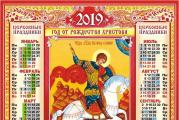Presidential Council for the Russian Language. Russian Language Council under the President of the Russian Federation
Signed a decree on the creation Russian Language Council under the President of the Russian Federation. The text of Decree of the President of the Russian Federation of June 9, 2014 No. 409 can be found on the website of the head of state.
The document approved the Regulations on the Council. It defines the objectives of the work of the body: preparation of proposals to determine the directions of development Russian language, coordination of activities of various institutions in the relevant area analysis of the implementation of programs and projects aimed at supporting the Russian language in Russia and abroad.
Council meetings are scheduled to be held at least once every six months. At least half of the council members must be present at each meeting. The meetings will usually take place in Moscow, but if necessary, they can be field.
Adviser to the President of the Russian Federation appointed Chairman of the Council Vladimir Tolstoy. The council included, in particular, CEO ITAR-TASS Sergei Mikhailov, Head of the Russian Academy of Education Ludmila Verbitskaya, Dean of the Faculty of Journalism, Moscow State University Elena Vartanova, Project Manager " Total dictation" Olga Rebkovets, head of the All-Russian State Television and Radio Broadcasting Company Oleg Dobrodeev, writers Boris Ekimov and Igor Volgin, etc. (total 43 people).
Earlier, in November 2013, the Russian Language Council was established under the Government of the Russian Federation. It was headed by Deputy Prime Minister Olga Golodets, and the Minister of Education and Science of the Russian Federation became her deputy Dmitry Livanov.
G. No. 519 "On streamlining the system of advisory and advisory bodies under the President of the Russian Federation."
In pursuance of Decree No. 519, on December 31, 1997, the Government of the Russian Federation, by its Decree No. 1674, formed Russian Language Council under the Government of the Russian Federation, and also approved the Regulations on the Council and its composition.
- informing the President of the Russian Federation about the problems of the development of the Russian language;
- development of proposals for the basics public policy in the field of the Russian language;
- making suggestions and recommendations to support the Russian language as state language Russian Federation, expanding the use of the Russian language in interethnic and international communication, improving the culture of Russian language proficiency;
- development of proposals for improving the training of specialists whose activities are related to the professional use of the Russian language;
- preparation of recommendations for the development of fundamental and applied scientific research in the field of the Russian language;
- assistance in the creation of an effective system of popularization of knowledge about the Russian language through the means mass media and through publishing activities in the field of the Russian language.
- Yarov Yury Fedorovich - Deputy Prime Minister of the Russian Federation (Chairman of the Council)
- Kinelev Vladimir Georgievich - Chairman of the State Committee for Higher Education of Russia (Deputy Chairman of the Council)
- Chelyshev Evgeny Petrovich - Academician-Secretary of the Department of Literature and Language of the Russian Academy of Sciences (Deputy Chairman of the Council)
- Asmolov Alexander Grigorievich - Deputy Minister of Education of the Russian Federation, Academician of the Russian Academy of Education
- Verbitskaya Lyudmila Alekseevna - rector of St. Petersburg state university, Academician of the Russian Academy of Education
- Gorodilova Galina Georgievna – Professor of the Moscow Pedagogical State University
- Danilova Galina Ivanovna - teacher of Russian language and literature of Novopodrezkovskaya high school Khimki district, Moscow region
- Demin Vadim Petrovich - Deputy Minister of Culture of the Russian Federation
- Zhuravlev Anatoly Fedorovich – Head of the Department of the Institute of Slavic and Balkan Studies of the Russian Academy of Sciences
- Ivleva Valentina Nikolaevna - teacher of the Russian language at school No. 12 in St. Petersburg
- Karaulov Yury Nikolaevich – Director of the Russian Language Institute of the Russian Academy of Sciences, Corresponding Member of the Russian Academy of Sciences
- Kostomarov Vitaly Grigorievich - Rector of the Pushkin Russian Language Institute, President of the International Association of Teachers of Russian Language and Literature, Academician of the Russian Academy of Education
- Krasavchenko Sergey Nikolaevich - First Deputy Head of the Administration of the President of the Russian Federation
- Kuznetsov Felix Feodosevich - Director of the A. M. Gorky Institute of World Literature of the Russian Academy of Sciences, Corresponding Member of the Russian Academy of Sciences
- Leontiev Aleksey Alekseevich - Rector of the Institute of Languages and Cultures named after L. N. Tolstoy, Academician of the Russian Academy of Education
- Likhachev Dmitry Sergeevich - Chairman of the Pushkin Commission of the Russian Academy of Sciences, Academician of the Russian Academy of Sciences
- Lopushanskaya Sofia Petrovna – Head of the Russian Language Department, Volgograd State University
- Meskov Valery Sergeevich - Deputy Chairman of the State Committee for Higher Education of Russia
- Musukaeva Angella Khamitovna - Head of the Department of Russian Literature, Kabardino-Balkarian State University
- Nikitina Irina Nikolaevna - teacher-methodologist of secondary school No. 754 in Moscow
- Penkovsky Alexander Borisovich - Professor of the Vladimir State Pedagogical Institute
- Rasputin Valentin Grigorievich - writer, member of the Writers' Union of Russia
- Remneva Marina Leontievna - Dean of the Faculty of Philology, Lomonosov Moscow State University
- Rozov Viktor Sergeevich - playwright, member of the Writers' Union of Russia
- Sadovnichiy Viktor Antonovich – Rector of the Lomonosov Moscow State University, Corresponding Member of the Russian Academy of Sciences
- Samsonov Nikolai Georgievich - Head of the Department of the Russian Language, Yakut State University
- Sirotinina Olga Borisovna – Professor of Saratov State University
- Skatov Nikolai Nikolaevich - Director of the Institute of Russian Literature (Pushkin House) of the Russian Academy of Sciences
- Sklyarevskaya Galina Nikolaevna – Head of the Department of the Institute of Linguistic Research of the Russian Academy of Sciences
- Tarlanov Zamir Kurbanovich - Head of the Department of the Russian Language, Petrozavodsk State University
- Tolstoy Ilya Vladimirovich – Head of the Department of Stylistics of the Russian Language, Lomonosov Moscow State University
- Tolstoy Nikita Ilyich - Chairman of the Board of the Russian Humanitarian Science Foundation, Academician of the Russian Academy of Sciences
- Trubachev Oleg Nikolaevich – Head of the Department of the Russian Language Institute of the Russian Academy of Sciences, Academician of the Russian Academy of Sciences
- Tumasheva Dilyara Garifovna – Head of the Department of Oriental Languages, Kazan State University named after V. I. Ulyanov-Lenin
- Hieromonk Philip (Vasiltsev) - superintendent of the synodal residence of His Holiness Patriarch of Moscow and All Rus'
- Khaleeva Irina Ivanovna – Rector of the Moscow State Linguistic University
- Chernushenko Vladislav Alexandrovich - Rector of the St. Petersburg State Conservatory
- Shadrikov Vladimir Dmitrievich - Deputy Chairman of the State Committee for Higher Education of Russia
| President of Russian Federation | |
|---|---|
| presidents | Boris Yeltsin¹ (1991-1999) Vladimir Putin (2000-2008) Dmitry Medvedev (2008-2012) Vladimir Putin (since 2012) |
| Acting | Alexander Rutskoi ² (1993) Viktor Chernomyrdin (1996) Vladimir Putin (1999-2000) |
| Vice President (post abolished) | Alexander Rutskoi ³ (1991-1993) |
| Elections | 1991 |
| Taking office | Oath |
| Removal from office | 1993 impeachment attempt 1998-1999 impeachment attempt |
| Resignations | Resignation 1999 |
| Supreme Commander-in-Chief of the Russian Armed Forces |
|
The contrast of salaries in education is becoming frightening: in the capital, teachers can receive more than 100 thousand rubles, and, for example, in the Republic of Tyva - 5.6 thousand ... To make ends meet, schools continue to collect money from parents. At the same time, according to the Institute of Education of the Higher School of Economics, since 2014, the country has been reducing unit spending on education. What to do? An attempt to answer the eternal question is in the article by Igor Smirnov.
The expansion of interethnic communication requires the younger generation to have a confident knowledge of foreign languages. However, without proper motivation and practice, the learning process will only be an imitation. But where to practice? On the one hand, this is more than obvious - on the Internet. However, there are other ways to establish educational communication with native speakers. About them - in the heading "Educational technologies".
"I never thought that writing children's poetry could be so much fun ... This is a game, this is permission to give up complexity, this is a space where you can laugh and laugh yourself, and this is a voice that I did not even suspect in myself," she shared with us poet Vera Polozkova with her discovery. Read her interview in the "UG Guest" section.
On June 20, 2017, a meeting of the Russian Language Council under the President of the Russian Federation was held.
Council members discussed the problems of modern philological education, the Russian language in the media and the Internet, the preparation and examination of dictionaries and manuals in the Russian language, the concept of a program to support children's and youth reading, the preparation of a new academic history of Russian literature.
With a report on distance learning Russian language, Vice-Rector for Science of the Pushkin Institute spoke Mikhail Osadchiy.
He noted that all national language institutes, such as the Goethe Institute, the Confucius Institute, the Cervantes Institute, are actively developing online tools, there is an active development of the online market, the volume of which, according to experts, will double by 2021. Russia does not lag behind these processes: on behalf of the Russian Language Council under the Government of the Russian Federation and the Ministry of Education and Science, the Pushkin Institute is implementing a large-scale project to create a national portal for learning the Russian language "Education in Russian". Dozens of scientists and teachers from leading universities of our country worked on the creation of this project. foreign countries- these are Moscow State University, St. Petersburg State University, Peoples' Friendship University of Russia, Tomsk Polytechnic University, the Paris Institute of Oriental Languages and Civilizations and others. " Today, on the Internet, you can learn not only popular European languages, but also languages that are considered by some to be especially difficult - Chinese, Korean, Japanese, - noted Mikhail Osadchiy. - There is no reliable scientific data confirming that the Russian language is somehow particularly difficult. The Russian language is easier for representatives of some nationalities and more difficult for others. And so with every language».
The Vice-Rector for Science of the Pushkin Institute presented the capabilities of the Education in Russian portal and asked the members of the Council to recommend that the professional community use the resources of the portal in teaching the Russian language. " A competent teacher uses electronic resources to maintain motivation, organization independent work learners, testing, gamification educational process– in a word, it makes the process of learning a language interesting for modern young people", - added Mikhail Osadchiy.
The official website of the FSBEI HE "State IRL named after A.S. Pushkin" uses cookies and their analogues for the quality of the site and the storage of user settings on the user's device. We also collect data using Google Analytics, Yandex.Metrics, Mail.ru and Sputnik counters for site visit statistics. By clicking OK and continuing to use the site, you confirm that you have been informed and agree with this and with our Policy regarding the processing of personal data, give your consent to the processing of your personal data. If you disagree, please leave the site and do not use it. You can disable cookies in your web browser settings.
The site"s official website uses cookies to ensure high-quality work and storage of users" settings on their devices. We also collect some data for site statistics using Google Analytics, Yandex.Metrika, Mail.ru and Sputnik counters. By clicking OK and continuing using our website, you acknowledge you are informed of and agree with that and our privacy policy. If you are not agree we kindly ask you to leave our website and not to use it. You may switch off cookies in your browser tools.
The Russian Language Council under the Russian government has been abolished. This decision is due to the fact that a similar council exists under the president, it duplicated the functions of the government council
Dmitry Medvedev (Photo: Alexander Astafiev / TASS)
The Russian Language Council under the Russian government was abolished on September 22, follows from a resolution signed by Prime Minister Dmitry Medvedev. The document was published on the official portal of legal information today, September 27.
The resolution also states that the Ministry of Education needs to submit its proposals for coordinating the work of executive bodies for state support and the development of the Russian language to another Russian Language Council - under the President of Russia.
They decided to close the council under the government, since a similar structure - the Council for the Russian Language - exists under the president, an interlocutor in the Ministry of Education explained to RBC.
The press service of the Ministry of Education told RBC that the resolution was aimed at eliminating duplication of work. “We are not talking about reducing attention to the issue. Promotion of the Russian language for last years increased attention is being paid, within the framework of these tasks, a separate subprogram is being implemented - “Development and dissemination of the Russian language as the basis of civil self-identity and language international dialogue”, the ministry told RBC, noting that there are other support mechanisms, including grants allocated to “partner organizations”.
Some issues that were considered by the Russian Language Council under the government were then also considered by a similar council under the president, the department explained. We are talking about coordinating the activities of state authorities in matters related to the protection and support of the Russian language, as well as analyzing the effectiveness of programs and projects that are aimed at developing, protecting and supporting the Russian language in the Russian Federation abroad.
The Government Council for the Russian Language was established in December 1997 and existed until 2004, was closed and restored in 2013. The last meeting of the council took place in October 2017 - it discussed the teaching of the Russian language in schools.
According to a document published on the government website, this body was headed by Deputy Prime Minister Olga Golodets. The government council included Minister of Education Olga Vasilyeva, former First Deputy Minister of Culture Vladimir Aristarkhov, Deputy Minister of Communications Alexei Volin, President of the Russian Academy of Education and Chairman of the Board of Trustees of the Russkiy Mir Foundation Lyudmila Verbitskaya and others.
A representative of Golodets, in a conversation with RBC, noted that the oversight of the education sector, including the development of the Russian language, after the change of government, went to another vice-premier.
The Presidential Council for the Russian Language was established in 2014. Its last meeting was held in December 2016 - it was a joint meeting with presidential council on culture and art, follows from the message on the Kremlin website. This structure is headed by Vladimir Tolstoy, Advisor to the President of Russia.




